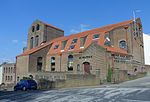St Luke's Church, Queen's Park, Brighton
19th-century Church of England church buildingsArthur Blomfield church buildingsChurch of England church buildings in Brighton and HoveChurches completed in 1885Grade II listed buildings in Brighton and Hove ... and 1 more
Grade II listed churches in East Sussex

St Luke's Church is an Anglican church in the Queen's Park area of Brighton, part of the English city of Brighton and Hove. Occupying a large corner site on Queen's Park Road, it was designed in the 1880s by Sir Arthur Blomfield in the Early English style, and has been given listed building status because of its architectural importance.
Excerpt from the Wikipedia article St Luke's Church, Queen's Park, Brighton (License: CC BY-SA 3.0, Authors, Images).St Luke's Church, Queen's Park, Brighton
Queens Park Terrace, Brighton Queen's Park
Geographical coordinates (GPS) Address External links Nearby Places Show on map
Geographical coordinates (GPS)
| Latitude | Longitude |
|---|---|
| N 50.827666666667 ° | E -0.12416666666667 ° |
Address
St Luke's
Queens Park Terrace
BN2 9YA Brighton, Queen's Park
England, United Kingdom
Open on Google Maps









